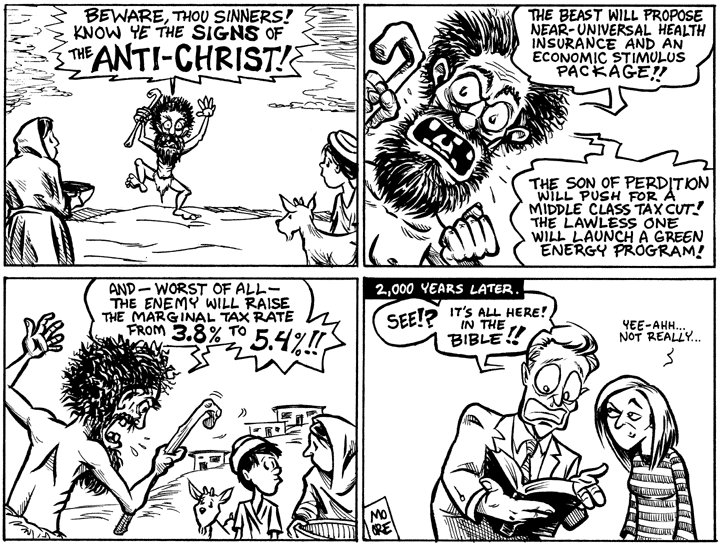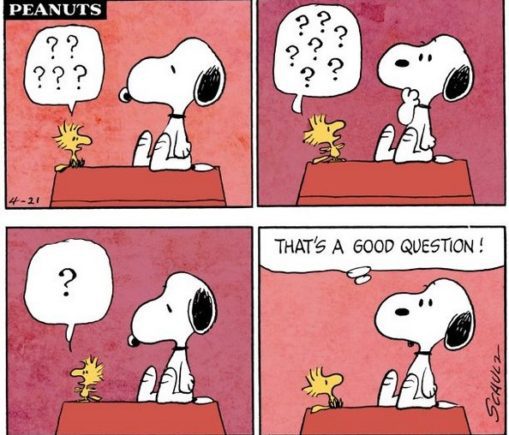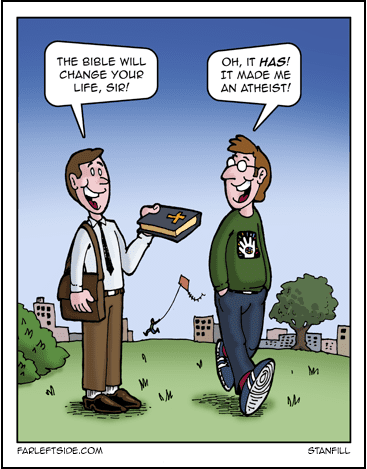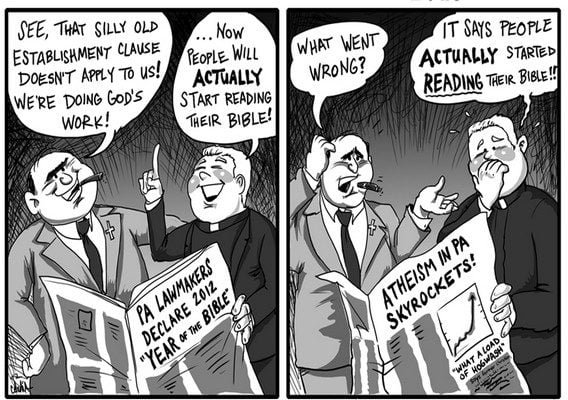
Most Evangelicals claim to be “people of the book.” The first church I worked for in the late 70s had an advertising sign located at a member’s home on Route 15 that said, “The Blood, the Book, and the Blessed Hope.” Park in front of a local Catholic church or a mainline congregation and observe how few members carry their Bibles to church. Do the same at a local Independent Fundamentalist Baptist (IFB) and you will see that MOST members, including children, bring their (KJV) Bibles to church. Granted, after church, many of those Bibles will be returned to the front dash, back window, or underneath the seats of their automobiles. Some members “store” their Bibles in their car trunks — safe and secure, ready for the next Sunday.
What most members DON’T do is regularly read/study the Bible. In fact, most Evangelicals haven’t read the Bible through once, yet they are “people of the Book?” Sure, buddy, sure. Imagine if I said I was a follower and worshipper of Harry Potter, the greatest wizard of all time, yet when asked if I had read all seven books in the Harry Potter series, I reply, “I only read book one and book four.” How could I be a follower and worshipper of Harry Potter and not read all seven books? Yet, hundreds of millions of people claim to be Christians without ever reading the Bible from cover to cover. If the Bible is THE book above all other books, and different from them in every possible way as the inspired, inerrant, and infallible Word of God, why do most Christians rarely read the Bible, and fewer still read from table of contents through concordance? The Bible commands Christians to judge others by their fruit (good works). Based on countless surveys and studies, Evangelicals may claim to be “people of the Book, but they are largely ignorant of what it says. And that includes more than a few preachers who do little, if any, Bible reading/study outside of preparation for their sermons. Worse, some preachers don’t read or study the Bible for their sermons either. Instead, they buy books of sermons or rip off sermons preached by big-name preachers. There’s no time for the Word of God when you have golf matches to play, hunting trips to take, and conferences and meetings to attend.
As a former Evangelical preacher, I worked my ass off ministering to church members and community residents. But, I never sacrificed my reading and study of the Bible, typically spending twenty hours a week preparing my sermons and reading devotionally. I was always troubled by colleagues in the ministry who were lazy, indifferent to the needs of others, and spent more time on entertainment and “family time” than they did on the actual, God-ordained work of the ministry.
Here’s the most dangerous thing Evangelicals can do: READ THE BIBLE FROM COVER TO COVER. Take every book of the Bible as written. The Bible is not a univocal text. Careful readers of the Bible will quickly learn that it contradicts itself, justifies immoral behavior, and is littered with mistakes and errors. BY all means, consult interlinears, concordances, and other text tools, but avoid books written by Evangelical authors. Their goal is to indoctrinate and condition, rather than impart knowledge and understanding.
If Evangelicals truly become “people of the book,” it is likely they will stop being Evangelicals after reading and studying ALL OF THE BIBLE. Many of the Evangelicals-turned-atheists I know deconverted after reading the Bible. I encourage every Evangelical to read the Bible. Every book, every chapter, every verse, and every word. Don’t listen to your pastor. Remember, he has a job and salary to protect. Don’t rely on Evangelical apologists or devotional books. Use your mind, pondering what the text actually says. You will find that many Evangelical preachers play loose with the Biblical text, using it as proof for peculiar beliefs and dogmas. Have you ever heard your pastor claim that there are numerous prophecies about Jesus (the Messiah)? Most church members give a shout-out to Jesus without ever investigating whether their pastor’s claims are true. They aren’t.
To my Evangelical readers, I say, please read the Bible. All of it. I guarantee you that if you will do this, your life will dramatically change. Granted, you may become an agnostic or an atheist, but you will, at the very least, have truth on your side. You will no longer govern your lives based on what is uttered from the pulpit. You will no longer have a “borrowed” theology. Most preachers enter the ministry with a borrowed theology, and unless they do the necessary hard work in the study, they will never mature intellectually. And if they won’t do what’s necessary to be an educated man of God, their parishioners will remain stupid and ignorant too.
Bruce Gerencser, 68, lives in rural Northwest Ohio with his wife of 47 years. He and his wife have six grown children and sixteen grandchildren. Bruce pastored Evangelical churches for twenty-five years in Ohio, Texas, and Michigan. Bruce left the ministry in 2005, and in 2008 he left Christianity. Bruce is now a humanist and an atheist.
Your comments are welcome and appreciated. All first-time comments are moderated. Please read the commenting rules before commenting.
You can email Bruce via the Contact Form.



